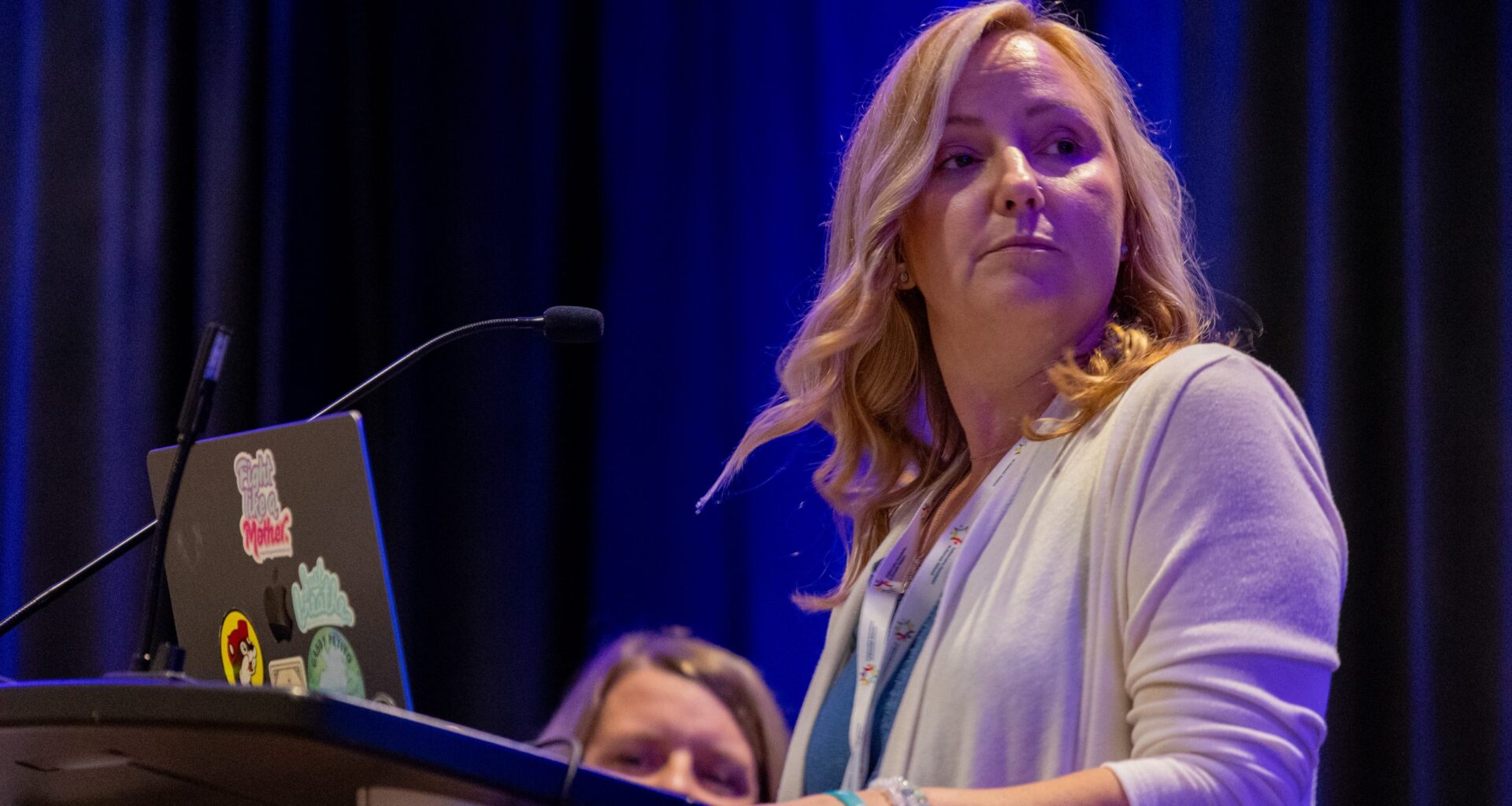Every hour in San Antonio, there are seven 9-1-1 calls reporting domestic violence.
“I know that’s not much different than many other communities,” said Judge Monique Diaz of Bexar County’s 150th District Court. “But It’s important for us to know how domestic violence is impacting us here and that we are doing something about it.”
About 200 advocates, public officials, service providers and law enforcement officers filled the ballroom at the Henry B. González Convention Center on Friday morning for the sixth annual Domestic Violence Awareness Symposium and another 300 people tuned in virtually.
The symposium is organized by the Collaborative Commission on Domestic Violence, a joint initiative formed in 2019 by Bexar County and the City of San Antonio to break down barriers to collaboration between courts, police, health departments, hospitals and nonprofits.
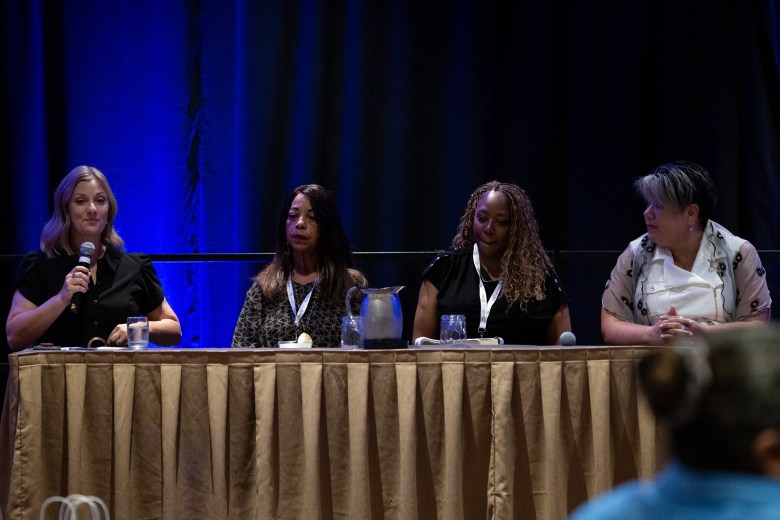 KSAT-12 reporter Courtney Friedman moderates a panel discussion with three survivors of domestic violence at the sixth annual Domestic Violence Awareness Symposium on Friday, Oct. 3, 2025. Credit: Diego Medel / San Antonio Report
KSAT-12 reporter Courtney Friedman moderates a panel discussion with three survivors of domestic violence at the sixth annual Domestic Violence Awareness Symposium on Friday, Oct. 3, 2025. Credit: Diego Medel / San Antonio Report
The morning’s first session, “Survivor Voices: Stories of Strength and Healing” set the tone for the day-long event. Testimonies from three women captured the complexity behind the decision to stay and the final decision to leave after years of abuse.
The women spoke about fear, faith and the slow process of rebuilding their lives. They described the obstacles that kept them in abusive relationships — shame, financial dependence and families who urged them to stay.
Throughout the day, panelists explored those experiences through discussion on prevention, survivor support and systematic reform. Sessions covered trauma-informed housing, coordinated crisis response and early intervention for children exposed to violence.
Erica Haller-Stevenson, a violence prevention administrator for Metro Health, said this year’s programming placed particular focus on housing instability, one of the most common results and fears in family violence cases.
“The city’s Point-in-Time count from earlier this year found that somewhere around 49% of people who were homeless were homeless because of domestic violence,” Haller-Stevenson said.
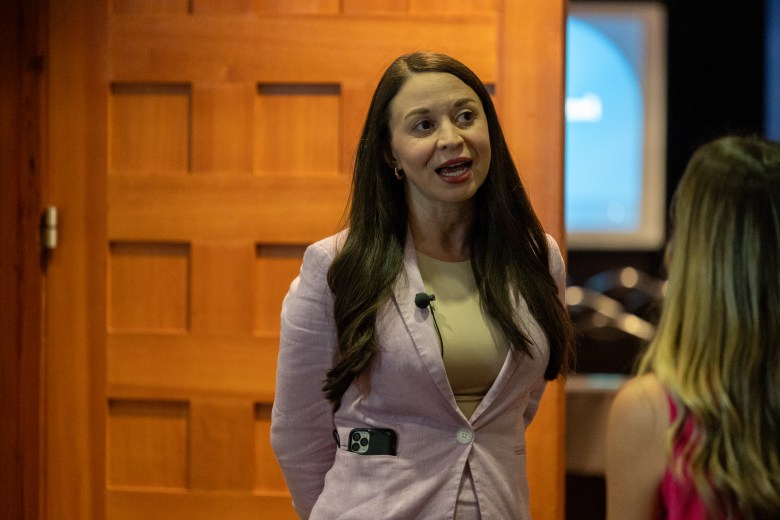 Judge Monique Diaz, county co-chair of the Collaborative Commission on Domestic Violence, speaks during an interview at the sixth annual Domestic Violence Awareness Symposium on Friday, Oct. 3, 2025. Credit: Diego Medel / San Antonio Report
Judge Monique Diaz, county co-chair of the Collaborative Commission on Domestic Violence, speaks during an interview at the sixth annual Domestic Violence Awareness Symposium on Friday, Oct. 3, 2025. Credit: Diego Medel / San Antonio Report
Diaz said meaningful progress would require addressing both sides of the abuse.
“I think rightfully so, a lot of focus is often placed on resources and assistance for survivors of family violence. At the CCDV we look at the entire picture,” Diaz said. “We try to ensure that the person who has caused harm is also getting the help that they need to break their own cycles of abuse.”
That message carried into a candid discussion during the Voices of Accountability panel. Two men — Montgomery McCrory and Ricardo Munoz— spoke about their experiences as former perpetrators of domestic violence, who successfully completed Batterer’s Intervention and Prevention Programs called BIPP.
BIPP is a group therapy course that consists of 24 group sessions focused on allowing perpetrators to take responsibility for their abusive behavior and teaches them the fundamentals of a healthy, non-violent relationship.
Both men said BIPP programs forced them to confront how power and control shape abusive behavior.
“The trail of trauma, the trail of people that I had hurt, the things that I’d done,” McCrory said. “The weight was almost overbearing.”
They now advocate for prevention and accountability, challenging cultural norms that equate masculinity with dominance. During the discussion, they shared messages for survivors of a crime they once committed themselves.
“I think you guys are all incredibly strong, a great example of survival and resilience,” Munoz said. “What we as perpetrators have tried to take from you, you guys have been able to stand back up and say, ‘No, you don’t.’ And I also tell you that I’m making a commitment to — instead of being a part of the problem — being a part of this solution.”
“I would like to say I’m deeply empathetic and apologetic that those things have happened to you,” McCrory added. “On behalf of the abuser side of it, these things aren’t OK, and I hope there’s healing.”
The symposium’s closing keynote featured Nicole Schmidt and Tara Petito, mother and stepmother of slain travel blogger Gabby Petito.
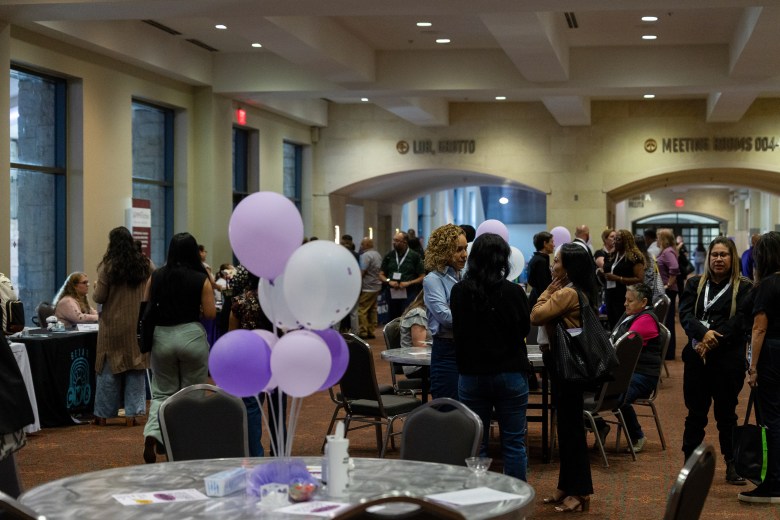 Advocates, public officials and service providers gather to discuss collaborative approaches to domestic violence during the sixth annual Domestic Violence Awareness Symposium at the Henry B. González Convention Center on Friday, Oct. 3, 2025. Credit: Diego Medel / San Antonio Report
Advocates, public officials and service providers gather to discuss collaborative approaches to domestic violence during the sixth annual Domestic Violence Awareness Symposium at the Henry B. González Convention Center on Friday, Oct. 3, 2025. Credit: Diego Medel / San Antonio Report
Petito’s 2021 death drew national attention and has since become a catalyst for education and reform around intimate-partner violence. Through the Gabby Petito Foundation, Schmidt and Petito fund survivor services, first responder training and awareness campaigns aimed at recognizing the early signs of abuse.
They spoke about the foundation’s work with local agencies across the country, including law enforcement training on identifying patterns of coercive control and public education on digital safety and social media awareness.
“Gabby’s voice was silenced,” Petito said. “But through her story, we hope to protect others, empower survivors and elevate voices that need to be heard.”
Schmidt and Petito told attendees they learned, after Gabby’s death, how manipulation, isolation and control had gradually replaced affection — signs that were difficult for loved ones to recognize at the time.
“Gabby’s story looked picture-perfect from the outside — traveling, smiling, in love,” Schmidt said. “What we didn’t see was how things were changing behind the scenes.”
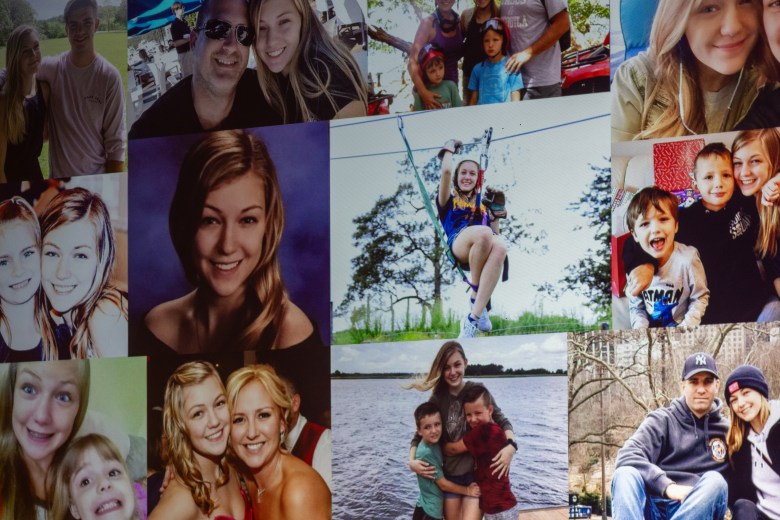 A collage of images of Gabby Petito displayed during the keynote address at the sixth annual Domestic Violence Awareness Symposium at the Henry B. González Convention Center on Friday, Oct. 3, 2025. Credit: Diego Medel / San Antonio Report
A collage of images of Gabby Petito displayed during the keynote address at the sixth annual Domestic Violence Awareness Symposium at the Henry B. González Convention Center on Friday, Oct. 3, 2025. Credit: Diego Medel / San Antonio Report
They urged attendees to continue pushing for collaboration among victim services, law enforcement and the courts, emphasizing that early intervention and education are key to preventing further violence.
The keynote concluded with a video featuring messages from survivors describing how Gabby Petito’s story encouraged them to seek help and raise awareness about domestic violence.
If you or someone you know is experiencing domestic violence, call San Antonio’s Family Violence Prevention Services at 210-733-8810 or the National Domestic Violence Hotline at 800-799-7233. The hotlines are open 24/7. Find local resources here.
